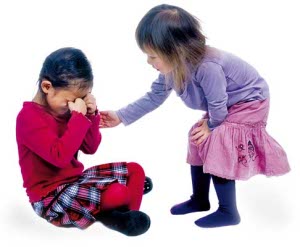Last summer a mother in Minnesota posted a video of her son and daughter talking about bullying in their school. It’s heartbreaking to watch.
The kids are distraught because even though they have reported what has happened, the school doesn’t appear to have taken any action to stop the problem. See: http://article.wn.com/view/2014/05/13/Fosston_Bus_Driver_Responds_to_Bullying_Allegation/
Now, you will notice that – it’s quite possible that the school did take action. But they aren’t allowed to tell the kids or the victim’s parents what that action is. In the meantime, these kids are still being victimized by their bullies and as far as they can tell, they reported, as they are told to – and the other kids didn’t get any consequences at all.
Assuming that the school did take action, the lack of communication and the perception it causes that nothing is being done, is part of the problem. So how can parents help their kids when they experience bullying, when the school doesn’t appear to be responding to their concerns?
The answers is that parents need to follow up and support their kids. It’s not enough to tell a kid to talk to the teacher or the principal. The parent needs to follow up and call and report a problem as well. It is very easy for teachers and administrators to accept a child’s report and then not act on it. It’s much harder for them to do that when it is the parent who calls and makes the report.
Yes, the kid needs to be proactive and report what is happening, in real time to their teacher, or bus driver or principal or nurse or school psychologist. But the parent should be following up daily calling in with their own report to make sure that their child’s report is being taken care of properly. Parents can ask for updates that kids cannot. What is happening. What is the process. Will the offending child be removed so that your child will be kept safe? How is the school ensuring your child’s safety and the safety of the other children – because your child is not the only victim – and neither were the two kids in the video. What does the school need the parent to do?
You would be surprised at how much principals and administrators want to help, but have their hands tied by district policies and overlapping jurisdiction. In my school district, if there is a problem on the bus, I have to talk to the bus driver, the bus driver’s area supervisor and the school principal. The amount of time it take for a bus driver’s referral of a problem to make its way out of the school bus, through the school bus hierarchy and hopefully to the principal can take several days.
By being a proactive parent – you can talk to the school and talk to the principal on the same day and let them know there was a problem that same day – so that they can take action the very next day! Don’t assume that different parts of the school district administration talk to each other. They do, but not in an efficient way. And if something gets stuck in an inbox – it may never make it where it is supposed to go. By calling, and politely reporting – you can push these things along. For instance, my son was hit on the bus and the principal told me to call the bus and have them pull the video tape of the incident. It turns out – she couldn’t request that and if we waited, the tape would be recorded over.
Don’t interpret these delays in communication as – nothing is happening. In order to ensure something happens, you have to speed up and push to ensure that everyone is following the policy and that things get expedited. Should you have to do this? No. But we live in the real world and in the real world people are busy and you do need to push it to get it taken care of.
The result of your polite but insistent reporting on behalf of your child is that you will learn what the school’s processes are and you will be better able to support your child in real time. You will be able to tell your child what the school is doing to ensure it stops and you will be following up to make sure they follow their own processes, and by doing so, you will be encouraging and modeling for your child the behavior you need them to exhibit to get their bullying to stop.
For more on how to talk to your child’s school about bullying – check out this free – ecourse. https://bullyvaccineproject.com/how-to-talk-to-your-childs-school-so-they-will-actually-listen-and-help/

